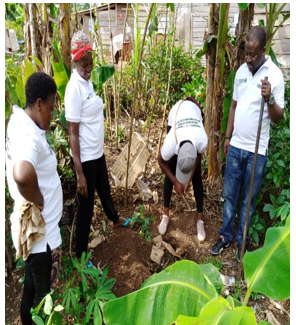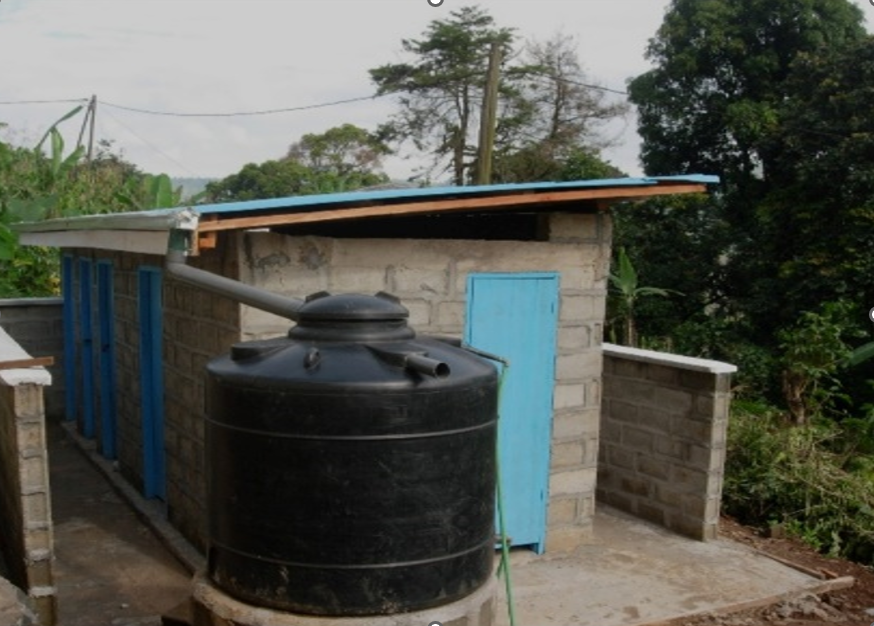Services
Our Services
EMLI's Focus Areas
EMLI delivers a wide range of humanitarian and development programmes, with a focus on systems, partnerships and building resilience.

Environmental Sustainability and Climate Action.
1.
Why this goal?
• Climate change is negatively impacting both the environment and vulnerable communities in Cameroon.
• Deforestation in Cameroon has resulted in the loss of over 1.1 million hectares of forest between 1990 and 2010.
• Climate change is exacerbating challenges such as crop failure, water scarcity, and the spread of diseases.
• Vulnerable populations, especially women and youth, are disproportionately affected by these environmental challenges.
• The need for sustainable environmental practices to preserve natural resources and ensure future resilience is urgent.
• Addressing environmental sustainability is critical for improving livelihoods, food security, and health.
Mobilizing an Integrated Response
- A comprehensive approach
addressing both ecological and socio-economic aspects of climate change is
essential.
- Climate action must involve
environmental conservation, climate adaptation, and social inclusion.
- Women and youth need to be
central actors in addressing climate challenges.
- Partnerships with local and
international stakeholders are key to scaling and ensuring sustainability.
- Focus on reducing
communities’ environmental footprints and building resilience to climate
shocks.
- Education and behavior
change at the community level are vital for sustainable solutions.
How will EMLI achieve this?
- Promoting Tree Planting
& Agroforestry:
Planting over 500,000 trees annually and promoting agroforestry to enhance
soil fertility and mitigate climate change.
- Supporting Climate-Smart
Agriculture Practices:
Introducing drought-resistant crops and sustainable farming practices to
help communities adapt to changing weather patterns.
- Developing Urban Green
Spaces:
Creating green spaces in urban areas to improve air quality, enhance
biodiversity, and raise climate awareness.
- Environmental Education
& Advocacy:
Running educational programs and public campaigns to increase awareness
about climate change and environmental protection
• Building Resilience through WASH Initiatives: Integrating climate-resilient water management systems to ensure sustainable water access.
• Collaborating with Stakeholders for Policy Influence: Advocating for stronger climate policies at local, national, and regional levels to support environmental sustainability.
.

2. Livelihoods and Economic Empowerment.
Why this goal? • In Cameroon, approximately 40% of the population lives below the poverty line, with rural communities particularly affected by food insecurity and limited access to income-generating opportunities. • Marginalized groups, especially women and youth, are disproportionately impacted by poverty and lack of access to resources that could help them build sustainable livelihoods. • Population growth, environmental degradation, and economic challenges exacerbate the vulnerability of these communities, making it essential to focus on strategies that promote sustainable livelihoods, reduce poverty, and improve economic resilience. • Empowering local populations to become economically independent, particularly through agriculture and small-scale enterprises, is critical to improving their quality of life and ensuring long-term sustainability. Mobilising an Integrated Response • EMLI recognizes that economic empowerment is closely linked to environmental sustainability and social equity. Therefore, our approach integrates the promotion of sustainable livelihoods with the conservation of natural resources. • There is a growing need to promote climate-resilient agriculture and diversified economic activities to reduce dependency on unpredictable weather patterns and global economic shifts. • By working with local communities, particularly women and youth, EMLI focuses on enhancing skills, providing access to financial services, and fostering entrepreneurship as key drivers of economic growth. • The integration of environmental education and the promotion of sustainable farming practices are essential to building a resilient economy that is in harmony with nature. How EMLI Will Achieve This • Supporting Rural Farmers: o EMLI will implement programs to improve agricultural productivity through the adoption of climate-smart techniques, including agroforestry and sustainable farming practices. o Providing training in modern farming methods, pest control, and soil conservation to enhance crop yields and income generation for rural farmers. o Strengthening market linkages by connecting farmers to both local and regional markets to ensure fair pricing and reduced post-harvest losses. • Promoting Youth and Women-Led Enterprises: o EMLI will support smallholder farmers, particularly women and youth, in creating income-generating enterprises through training, access to financial services, and mentorship. o Establishing micro-enterprises focused on value-added agricultural products such as organic fertilizers, food processing, and renewable energy solutions. o Partnering with local and international organizations to provide grants and affordable loans to these businesses. • Building Financial Literacy and Access: o EMLI will work with financial institutions to increase access to microfinance and credit facilities, enabling individuals and communities to invest in their livelihoods. o Offering financial literacy programs to teach budgeting, savings, and investment, helping community members manage resources effectively.

3. Water, Sanitation, and Hygiene (WASH).
Why this goal? Access to safe drinking water, improved sanitation, and hygiene (WASH) services are critical for improving public health and reducing poverty in Cameroon. According to UNICEF, about 13 million people in Cameroon lack access to basic sanitation services, and nearly 5 million people do not have access to clean drinking water. The situation is exacerbated by rapid urbanization, population growth, climate change and the on-going armed conflicts which intensify water scarcity and the spread of waterborne diseases, particularly in vulnerable communities. Addressing WASH challenges is essential for reducing preventable diseases and promoting community well-being. Mobilising an integrated response An integrated approach is key to addressing the complex WASH challenges in Cameroon. The global community recognizes that water, sanitation, and hygiene are fundamental to achieving health, education, and economic development goals. An integrated WASH response involves collaboration between governments, NGOs, local communities, and international organizations. It is critical to: • Promote hygiene education alongside the provision of water and sanitation services to ensure sustainable health improvements. • Engage communities in water resource management and sanitation activities to build local ownership and resilience. • Address the gendered aspects of WASH by ensuring women and girls have safe, accessible sanitation facilities and equal participation in decision-making processes. How EMLI will achieve this EMLI is committed to improving WASH services in marginalized and underserved communities through a comprehensive approach that emphasizes sustainability and community ownership. We will achieve this by: • Building and rehabilitating water supply systems in rural, peri-urban and urban areas, ensuring that communities have reliable access to safe drinking water. • Promoting sanitation and hygiene education through community-based campaigns, workshops, and training to reduce the spread of diseases linked to poor sanitation and hygiene practices. • Collaborating with local governments and other stakeholders to ensure that WASH infrastructure is inclusive, resilient, and meets the needs of vulnerable groups such as women, children, and internally displaced persons (IDPs). • Integrating climate-resilient water management practices that address water scarcity and adapt to changing environmental conditions, particularly in the face of climate change impacts.

4. Humanitarian Assistance for Displaced Communities
Conflict, instability, poor governance and climate change have created an unprecedented level of humanitarian need. Often spanning multiple geographies, crises are becoming increasingly complex and protracted, with affected communities needing additional support for longer periods of time. Saving lives and alleviating human suffering EMLI's Emergency Response function focuses on saving lives and alleviating human suffering. This response often involves prioritising needs such as food, water, shelter, cash and other non-food items. It also sees EMLI reduce morbidity and mortality through the delivery of targeted health responses, including: emergency sanitation, hygiene promotion and outbreak response. Such initiatives may then transition to more sustained and long-term programming, where the focus shifts to the rehabilitation of health, water, sanitation, food and other market systems.
DONATIONS
Donate Now Or Give Monthly
A donation today creates a better world for tomorrow.